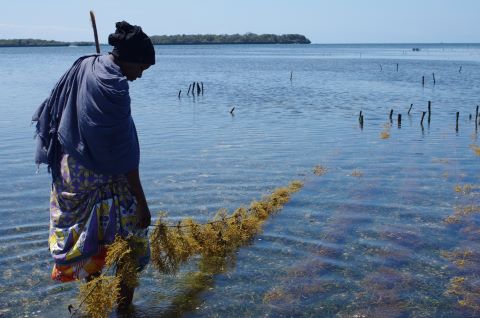Women's voices enhance small-scale fisheries management
Women make up 40% of the workforce in the small-scale fishing sector, but their participation is often overlooked.

This is evidenced by a study carried out by the ICTA-UAB, which analyses women's participation in small-scale fisheries management around the world and identifies the related socio-cultural, environmental, and economic impacts.
The study, led by ICTA-UAB researcher Mouna Chambon, reviews 124 case studies spanning 51 countries. One key finding is that 40% of the selected studies did not provide information on the gendered dimensions of SSF management, highlighting an important dearth of gender-disaggregated data in the fisheries literature. Analysing the rest of the studies that detailed women’s participation in SSF management, the research team found that women did not participate actively in management processes in 80% of the case studies.
In most of the cases studied, women were not formally excluded from the management of fishing communities, but their participation was limited, suggesting the persistence of social and cultural norms and gender stereotypes that contribute to undervaluing their opinions in meetings and alter their confidence. The general tendency is for women to attend management meetings, but not to intervene or speak up to influence the outcome of the meeting "because their opinion is not respected in the presence of men, especially if they are older".
Furthermore, the study reveals that women's exclusion from fisheries management results in negative outcomes, mainly on women's daily lives. However, in the few cases where women actively participated in fisheries management, this participation resulted in positive socio-cultural, environmental and economic impacts, not only for the women or local communities communities, but mostly for the social-ecological systems. The study sheds light on the urgent need to address the lack of women's participation in the management and governance of small-scale fishing communities, as well as the scarcity of gender-disaggregated data in fisheries research.
"A gender perspective needs to be promoted in the data collection methods used in fisheries research, in the management of communities and in the ecological research on their socio-ecological systems," says Patrizia Ziveri, oceanographer at ICTA-UAB and co-author of the study.
Overall, this article is a great contribution to scholars, practitioners and decision-makers working on sustainability topics to better understand the need to consider gender in fisheries settings and food systems more broadly.
Reference to the article:
Chambon, M., Miñarro, S., Alvarez Fernandez, S. et al. A synthesis of women’s participation in small-scale fisheries management: why women’s voices matter. Rev Fish Biol Fisheries 34, 43–63 (2024). https://doi.org/10.1007/s11160-023-09806-2